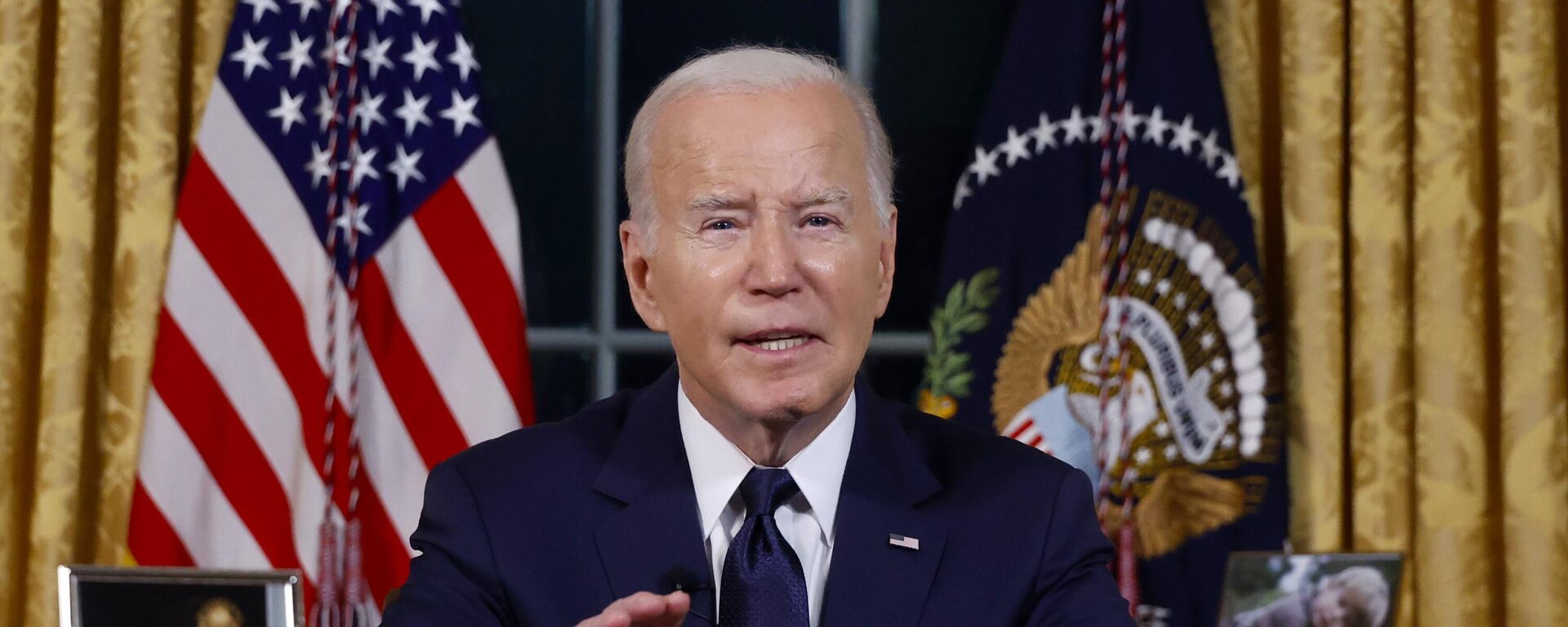https://sputnikglobe.com/20231024/wider-mideast-conflict-likely-to-disrupt-oil-markets-destabilize-world-economy---sachs-1114440955.html
Wider Mideast Conflict Likely to Disrupt Oil Markets, Destabilize World Economy - Sachs
Wider Mideast Conflict Likely to Disrupt Oil Markets, Destabilize World Economy - Sachs
Sputnik International
A wider conflict in the Middle East stemming from the Palestine-Israel conflict would likely disrupt oil markets and destabilize the global economy, world-renowned economist Jeffrey Sachs told Sputnik.
2023-10-24T03:28+0000
2023-10-24T03:28+0000
2024-01-30T10:27+0000
economy
jeffrey sachs
joe biden
israel
hamas
pentagon
global economy
oil market
oil markets
gaza strip
https://cdn1.img.sputnikglobe.com/img/107820/19/1078201903_0:173:1920:1253_1920x0_80_0_0_6a0dc1b083c8ae56f6c5b1377d68c598.jpg
"If there is a wider war in the Middle East, the oil markets will likely be disrupted," Sachs said. "This in turn would, of course, further destabilize the world economy." Sachs expects an Israeli ground invasion of Gaza will likely lead to a widening war. "I don’t believe that the Muslim world will look on quietly and passively if Israel is committing mass killings in Gaza, especially in a ground offensive," Sachs said. The United States has reportedly been urging Israel to delay its ground invasion in order to buy more time to negotiate the release of more hostages held by Hamas. Moreover, US President Joe Biden said in later remarks that any talks about a ceasefire between Israel and Hamas may only be possible if all hostages are released. Meanwhile, the United States is deploying the USS Dwight D. Eisenhower carrier strike group to the Persian Gulf amid an escalation of attacks on US forces in the region by Iran's "proxy forces." Per the Pentagon, the USS Gerald R. Ford carrier strike group is positioned in the Eastern Mediterranean to serve as a deterrent to any third parties that might consider joining the conflict against Israel.The Muslim world, Sachs said, should immediately call for a political solution to the current regional crisis, meaning establishing a Palestinian state combined with a plan for the demilitarization of the conflict, including the disarming of Hamas and the introduction of United Nations peacekeepers. According to Sachs, Hamas may have many motives for conducting its attacks against Israel on October 7, including to disrupt the Israel-Saudi normalization talks. US officials have indicated Saudi-Israeli normalization talks have not been scrapped, but negotiations are reportedly at a pause amid the Israel-Hamas crisis. Biden's Address to Nation 'Disaster, Call for More War'Shifting gears to President Joe Biden's address to the nation last Thursday, the world-renowned economist told Sputnik that the speech proved to be a call for more war that lacked a diplomatic plan to resolve dire global issues."Biden’s speech was a disaster, a call for more war, not for diplomacy," Sachs said.The speech reflects the control of US foreign policy by the military-industrial complex in the United States.On Friday, Biden submitted a $106 billion supplemental funding request to Congress that includes $61.4 billion for Ukraine, half of which is to provide Kiev with weapons and replenish US weapon stockpiles.The supplemental package also proposes $14.3 billion for Israel, which includes $10.6 billion for security assistance such as air and missile defense support and industrial base investments.
https://sputnikglobe.com/20231011/global-oil-market-now-balanced-situation-constantly-changing-1114112512.html
https://sputnikglobe.com/20231020/biden-excuses-push-for-israel-ukraine-aid-as-matter-of-national-security-in-rare-address--1114341191.html
israel
gaza strip
palestine
Sputnik International
feedback@sputniknews.com
+74956456601
MIA „Rossiya Segodnya“
2023
Sputnik International
feedback@sputniknews.com
+74956456601
MIA „Rossiya Segodnya“
News
en_EN
Sputnik International
feedback@sputniknews.com
+74956456601
MIA „Rossiya Segodnya“
Sputnik International
feedback@sputniknews.com
+74956456601
MIA „Rossiya Segodnya“
middle east, oil markets, global economy, palestine-israel conflict,
middle east, oil markets, global economy, palestine-israel conflict,
Wider Mideast Conflict Likely to Disrupt Oil Markets, Destabilize World Economy - Sachs
03:28 GMT 24.10.2023 (Updated: 10:27 GMT 30.01.2024) WASHINGTON (Sputnik) - A wider conflict in the Middle East stemming from the Palestine-Israel conflict would likely disrupt oil markets and destabilize the global economy, Jeffrey Sachs, a world-renowned economist and president of the UN Sustainable Development Solutions Network, told Sputnik.
"If there is a wider war in the Middle East, the oil markets will likely be disrupted," Sachs said. "This in turn would, of course, further destabilize the world economy."
Sachs expects an Israeli ground invasion of Gaza will likely lead to a widening war. "I don’t believe that the Muslim world will look on quietly and passively if Israel is committing mass killings in Gaza, especially in a ground offensive," Sachs said.
The United States has reportedly been urging Israel to delay its ground invasion in order to buy more time to negotiate the release of more hostages held by Hamas. Moreover, US President Joe Biden said in later remarks that any talks about a ceasefire between Israel and Hamas may only be possible if all hostages are released.
Meanwhile, the United States is deploying the USS Dwight D. Eisenhower carrier strike group to the Persian Gulf amid an escalation of attacks on US forces in the region by Iran's "proxy forces." Per the Pentagon, the USS Gerald R. Ford carrier strike group is positioned in the Eastern Mediterranean to serve as a deterrent to any third parties that might consider joining the conflict against Israel.

11 October 2023, 18:25 GMT
The Muslim world, Sachs said, should immediately call for a political solution to the current regional crisis, meaning establishing a Palestinian state combined with a plan for the demilitarization of the conflict, including the disarming of Hamas and the introduction of United Nations peacekeepers.
According to Sachs, Hamas may have many motives for conducting its attacks against Israel on October 7, including to disrupt the Israel-Saudi normalization talks. US officials have indicated Saudi-Israeli normalization talks have not been scrapped, but negotiations are reportedly at a pause amid the Israel-Hamas crisis.
On October 7, Hamas launched a surprise large-scale rocket attack against Israel from the Gaza Strip. Israel launched retaliatory strikes and ordered a complete blockade of the Gaza Strip, home to more than 2 million people, cutting off supplies of water, food and fuel.
The blockade was later eased to allow trucks with humanitarian aid into the Gaza Strip. The escalation of the conflict has resulted in thousands of people killed and injured on both sides.
Biden's Address to Nation 'Disaster, Call for More War'
Shifting gears to President Joe Biden's address to the nation last Thursday, the world-renowned economist told Sputnik that the speech proved to be a call for more war that lacked a diplomatic plan to resolve dire global issues.
Biden warned that the United States is facing an inflection point, a moment when decisions made now determine the future for decades to come. The US president then emphasized that the United States must boost security assistance for Israel and Ukraine.
"Biden’s speech was a disaster, a call for more war, not for diplomacy," Sachs said.
The speech reflects the control of US foreign policy by the military-industrial complex in the United States.

20 October 2023, 03:45 GMT
"We need diplomacy in Ukraine, Israel-Palestine, US-Iran, and other hotspots or war zones," Sachs said. "The United States' militarized approach is solving no problems."
On Friday, Biden submitted a $106 billion supplemental funding request to Congress that includes $61.4 billion for Ukraine, half of which is to provide Kiev with weapons and replenish US weapon stockpiles.
The supplemental package also proposes $14.3 billion for Israel, which includes $10.6 billion for security assistance such as air and missile defense support and industrial base investments.




